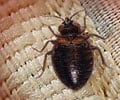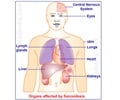Review the side-effects of Chloroquine as documented in medical literature. The term "side effects" refers to unintended effects that can occur as a result of taking the medication. In majority of the instances these side-effects are mild and easily tolerable, however sometimes they can be more severe and can be detrimental.
If the side effects are not tolerable adjusting the dosage or switching to a different medication can help to manage or overcome side effects. If you have any doubts or questions, we recommend seeking advice from your doctor or pharmacist.
Eye and ENT - Vision impairment, deafness, ringing in the ear and ear damage.
Musculoskeletal - Nerve disease and muscle weakness.
Gastrointestinal - Loss of appetite, nausea, vomiting, diarrhea and abdominal cramps.
Skin - Skin eruptions, pigmentation, itching, sensitivity to light, and hair loss.
Blood - Anemia, reversible decrease in white blood cells and platelet counts.
Central Nervous system - Seizures, headache, emotion, personality changes and depression.
Heart - Low blood pressure.
•Patients with enlarged heart or cardiomyopathy should be careful while using chloroquine, as it may cause abnormal rhythm.
• Avoid excess dosage.
Aralen
If the side effects are not tolerable adjusting the dosage or switching to a different medication can help to manage or overcome side effects. If you have any doubts or questions, we recommend seeking advice from your doctor or pharmacist.
Eye and ENT - Vision impairment, deafness, ringing in the ear and ear damage.
Musculoskeletal - Nerve disease and muscle weakness.
Gastrointestinal - Loss of appetite, nausea, vomiting, diarrhea and abdominal cramps.
Skin - Skin eruptions, pigmentation, itching, sensitivity to light, and hair loss.
Blood - Anemia, reversible decrease in white blood cells and platelet counts.
Central Nervous system - Seizures, headache, emotion, personality changes and depression.
Heart - Low blood pressure.
Other Precautions :
•Blood cell counts should be checked frequently if patients are given long term therapy.•Patients with enlarged heart or cardiomyopathy should be careful while using chloroquine, as it may cause abnormal rhythm.
• Avoid excess dosage.
Drug Name : Chloroquine
Chloroquine(Aralen) generic Chloroquine is used for the treatment of Malaria, Rheumatoid Arthritis, Lupus Erythematosus & COVID-19 Infection. Mechanism of action: It acts by blocking the action of enzyme ‘heme polymerase’ in malarial parasites and this leads to accumulation of heme - which is toxic to the malarial parasite. This leads to the death of the malarial parasite. Update: •FDA warns against the use of chloroquine or hydroxychloroquine for treating COVID-19 outside the hospital setting or a clinical trial due to high risk of heart rhythm issues. • Chloroquine and hydroxychloroquine gained attention in spite of sayings by the World Health Organization (WHO) that there is no definitive evidence they work for COVID-19 patients. • Larger, high-quality randomized clinical trials may be needed in order to precisely evaluate its effectiveness, according to University of Oxford's Kome Gbinigie, author of a report on anti-malarial testing for Covid-19. • More than 20 trials are being carried out on chloroquine for treating COVID-19 in the US, UK, Spain, and China.Trade Names for Chloroquine
India :
E -Vivax (30 ml) |
Y Vex Kit |
Aablaquin |
Clockwin P |
Z -Quine Para |
Chloroquin Phosphate |
Zolar |
Chloroquine Phosphate-250 mg |
Laquin |
Malgo |
Arquin |
Coec |
Chloroquine |
Quin EC |
Resochin |
Reochin |
Jagquin |
Emquin (155mg) |
Nivaquine -P |
Malarbin
International :
Aralen













